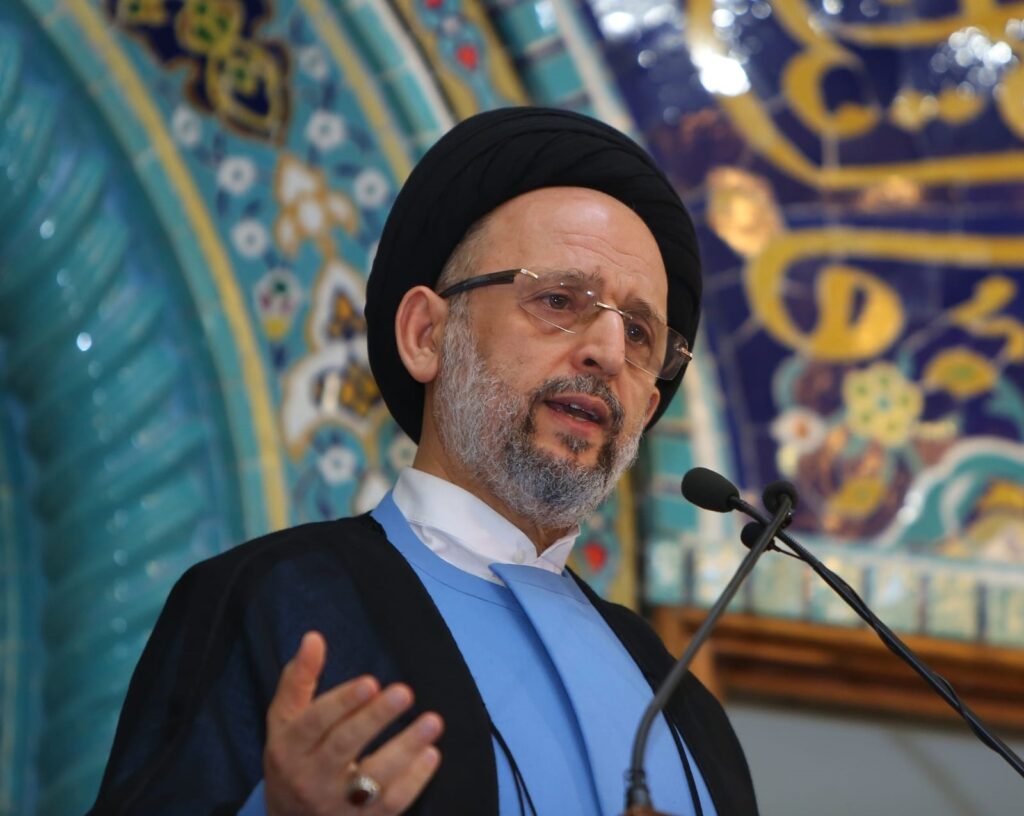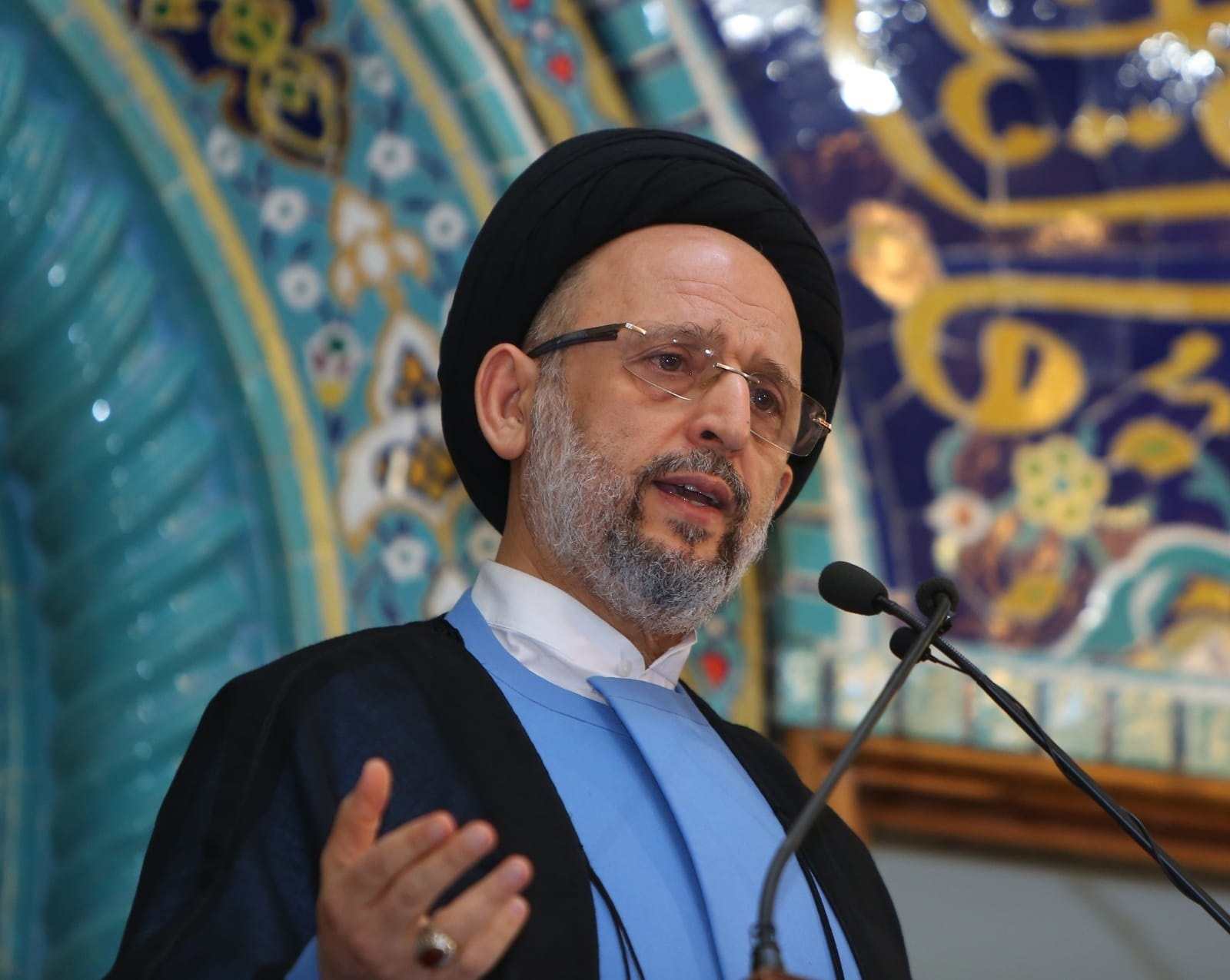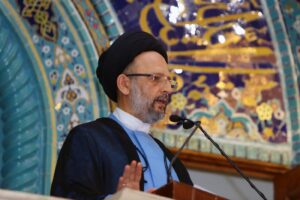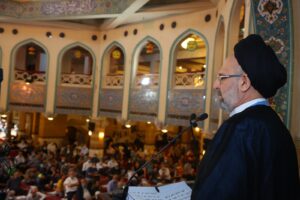In The Name of Allah, the Compassionate, The Merciful.
His Eminence, Sayyed Ali Fadlullah, delivered the two Friday prayer sermons at the Imamain Al-Hassanain Mosque, Zul Hijja 28, 1444/July 14, 2023. Several prominent religious scholars, dignitaries, and hundreds of believers attended the Jumu’a prayer. Following is a summary of the sermons.
The First Sermon
Allah, The Most Exalted, says in His Glorious Book: The truth is from your Lord, so do not be among the doubters. Then whoever argues with you about it after [this] knowledge has come to you – say, “Come, let us call our sons and your sons, our women and your women, ourselves and yourselves, then supplicate earnestly [together] and invoke the curse of Allah upon the liars [among us].” “Allah, The Most Exalted, speaks the truth.
On the 24th of Zul-Hijja of year 9H, an important event occurred: The Mubahalat, which took place between the Christians of Najran and the Messenger(p.) …
The Messenger(p.) invited the Archbishop of the Najran Christians to Medina to conduct a dialogue, in accordance with God’s call to His Messenger(p.) Say, “O People of the Scripture, come to a word that is equitable between us and you – that we will not worship except Allah and not associate anything with Him and not take one another as lords instead of Allah .”
The archbishop of Najran accepted and sent a big delegation of sixty priests. The Messenger(p.) received them in his mosque in Medina. At the beginning of the meeting, he started by pointing out that what he came up with did not come from a vacuum. He came to complete the message of Jesus Christ and the heavenly messages before him, and he calls to what Allah, The Most Exalted, has called to when He said: Say, [O believers], “We have believed in Allah and what has been revealed to us and what has been revealed to Abraham and Ishmael and Isaac and Jacob and the Descendants and what was given to Moses and Jesus and what was given to the prophets from their Lord. We make no distinction between any of them, and we are Muslims [in submission] to Him.” In response, the head of the delegation said: But you have a different view of Christ considering him a human being while we believe in his divinity. The messenger replied saying: I describe him as he described himself: “Indeed, I am the servant of Allah. He has given me the Scripture and made me a prophet. And He has made me blessed wherever I am and has enjoined upon me prayer and zakat as long as I remain alive.
The archbishop asked: if you say that Christ is a human being and a prophet, but not the son of God, then who is his father? How could he have been born without a father? The Prophet answered that if God wished so for some wise reason, He is capable of everything. Moreover, God created Adam without a father and a mother …
The head of the delegation then asked: You say he is a servant of God. How could he give life to the dead and cure the blind and the leper if he was not a god?
The Messenger (p.) said: This was done by Allah, The Most Exalted’s command, Who enabled him to perform these miracles. He says: And [make him] a messenger to the Children of Israel, [who will say], ‘Indeed I have come to you with a sign from your Lord in that I design for you from clay [that which is] like the form of a bird, then I breathe into it and it becomes a bird by permission of Allah. And I cure the blind and the leper, and I give life to the dead – by permission of Allah. And I inform you of what you eat and what you store in your houses. Indeed that is a sign for you if you are believers. …
– “ You also do not believe that he was crucified. If he was not then who was crucified?”
– I say what God Who is aware of everything said: And they did not kill him, nor did they crucify him, but [another] was made to resemble him to them
When the discussion went on and on without reaching the much-desired agreement, the Prophet (p.)called on them to resort to Mubahalat which is that both parties call Allah to punish the one who denies the right after knowing it.
The Christians then deliberated whether they should accept the Messenger(p.)’s call. In the end, their leader said: “If he challenges us with his people, in the manner kings do, we accept the challenge for he is not a prophet; but if he challenges us with his family in particular we don’t challenge him, for he is not going to put forward his family unless he is truthful”.
In the morning, the Messenger of Allah came with the Commander of the Faithful, Fatimah, Hassan and Hussein. When the Christians saw this, they decided not to enter Mubahala and reached an agreement with the Messenger(p.) giving them the freedom to practice their religion and the full rights of citizenship. Moreover, they had to pay taxes just as Muslims do. On their part, they promised not to violate the Islamic order and respect the decisions that the Islamic State take.
Dear loved ones: This event came to prove many things. Firstly: the relationship between Muslims and Christians was built, by Islam, on the basis of love and mutual respect, as the Muslims, for example, allowed the Christians in Medina to keep their crosses on and to pray in the Prophet’s Mosque. Allah, the Most Exalted, says in this respect: and you will find the nearest of them in affection to the believers those who say, “We are Christians.” That is because among them are priests and monks and because they are not arrogant.
Secondly: It stressed that objective and calm dialogue is the means that should be adopted whenever a disagreement occurs since it reduces the tension and solves the matter by what is best.
Thirdly: Mubahalat can be used to resolve any difference between people, by leaving the judgment to God whenever the disagreement heightens and no agreement is reached.
Dear loved ones: We are in dire need to enhance the language of dialogue among us which Islam called for and considered the basis of the relations with those we differ with, including Christians. Dialogue is bound to dissipate their fears, underscore what we both agree upon and join our efforts to confront the challenges that face Islam and Christianity on the moral and humanitarian levels, so that it would be an alternative to malice, hatred and conflict.
The Second Sermon
Worshippers of Allah, The Most Exalted, I advise you and myself with the following Ayats which it is said to have been revealed on the 25th of Zul Hija:
Indeed, the righteous will drink from a cup whose mixture is of Kafur,
A spring of which the [righteous] servants of Allah will drink; they will make it gush forth in force [and abundance].
They [are those who] fulfill [their] vows and fear a Day whose evil will be widespread.
And they give food despite their love for it to the needy, the orphan, and the captive,
[Saying], “We feed you only for the countenance of Allah. We wish not from you reward or gratitude.
Indeed, We fear from our Lord a Day austere and distressful.”
So Allah will protect them from the evil of that Day and give them radiance and happiness
And will reward them for what they patiently endured [with] a garden [in Paradise] and silk [garments].
It was narrated that Al-Hassan and Al-Hussein were sick. The Prophet (p.) and a group of followers came to visit them. They suggested to Ali (a.s.) to take a vow for their recovery. So, Ali and Fatima took a vow that if Hassan and Hussein recovered, they would fast for three days. After a short while both of them recovered. Therefore, the family fasted for three days, but decided to give their breakfast to a poor man on the first day, a needy on the second day and a captive on the third… These Ayats were revealed to the Prophet to point to the award for their altruism that Allah, the Most Exalted, had granted them : Saying], “We feed you only for the countenance of Allah . We wish not from you reward or gratitude.
Indeed, We fear from our Lord a Day austere and distressful.”
So Allah will protect them from the evil of that Day and give them radiance and happiness
And will reward them for what they patiently endured [with] a garden [in Paradise] and silk [garments
Dear loved ones: We are in dire need to practice this virtue: to help the poor and the needy and prefer them over ourselves. By this, we express our love to Ahl el-Beit and build a strong and cohesive society that is able of confronting challenges…
We begin with the crisis of the vacant presidency which seems that there is no solution for shortly. All parties insist on their candidate for the office and seem not to wish to change their stance at least for the time being. In the meantime, the foreign forces which many local parties are waiting for an initiative from them to interfere to facilitate the finding of a solution seem unready to do that. This is because either the foreign forces are unable to reach an agreement between their countries on a solution for the Lebanese crisis due to the internal intractability of the problem or because they do not want to interfere since Lebanon is not on their priority list, which leaves the country in a state of vacuum which we afraid might last for a long time…
Regrettably, some are making statements claiming that there is no problem even if the vacuum remains for several years. They are not taking into consideration the country’s state of collapse and the living conditions the Lebanese are suffering from which have begun to threaten their lives and security…
On the internal level too, we warn from the European Parliament resolution that calls for keeping the Syrian refugees in Lebanon that aims to confine the repercussions of their crisis to Lebanon so that the refugees would not end up in its countries, without taking into consideration Lebanon’s sovereignty and the social and economic burdens that such resolutions induce. This has increased the Lebanese fears that there might be an international will to resettle refugees in their country, which calls for a firm Lebanese stance that pressurizes the European states to revoke their resolution and urge them instead to facilitate their return to their country.
As for the tension on the Lebanese-Palestinian borders, we call on the Lebanese to unify their ranks against the ongoing Zionist aggressions, especially after annexing the Lebanese part of the village of Ghagar… to prevent the Zionists from imposing a de-facto reality.
The seventeenth anniversary of the July War in which Lebanon was able, through the steadfastness of its People, army and resistance to fail the goals of establishing a new Middle East that this war aimed to achieve…
As we salute all sacrifices that were made to reach this achievement… and as we are certain that any new Zionist aggression will meet the same fate, we stress on being constantly alert for any new Zionist foolish act. We also welcome every effort made to enhance the internal immunity and enhance all the points of strength that would make the enemy think twice before it embarks on such an adventure and ensure that it will be defeated yet again.





